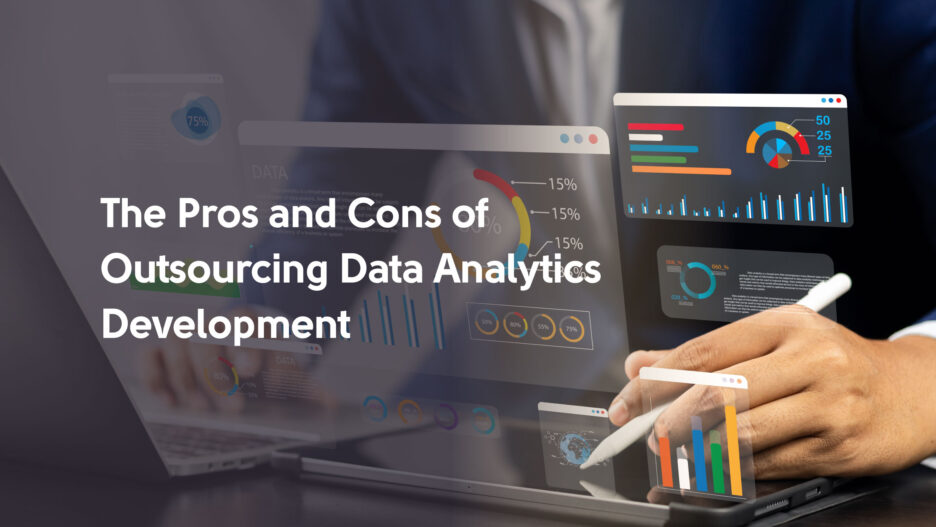We’re not the first ones to say it, so here goes: we live in an age where data is more valuable than gold. In fact, a multitude of different outlets have claimed the same, and rightfully so. Why? Companies are not only swimming, most of the time they are drowning in data, and as such, the real challenge lies in rising above water to turn those oceans of data into breathable, actionable insights.
You guessed it, this is where data analytics makes its grand entrance. Data analytics is the tried-and-true compass that helps businesses navigate the Triwizard Tournament data maze and find the goblet of fire (yeah, that’s a Harry Potter reference!) of valuable insights.
But here's the gazillion-dollar question: should you build your data analytics team in-house, or is outsourcing better? It's a bit like deciding whether to cook a gourmet meal yourself or order from one of the fanciest restaurants from your preferred food delivery service. Both have their merits, and the choice depends on your specific situation.
Let's dive into the world of data analytics outsourcing and explore the good, the bad, and the downright tricky aspects of this increasingly popular business strategy.
What's the Deal with Data Analytics Outsourcing?
According to Gartner experts, by 2025, at least 30% of GenAI projects will be abandoned after proof of concept due to poor data quality, inadequate risk controls, and escalating costs or unclear business value. Outsourcing data analytics is poised to be a much bigger decision than simply deciding whether to take on the task in-house or trust its proven specialists. It may very well be the game changer for your enterprise.
First things first – what exactly do we mean by outsourcing data analytics development? Simply put, it's when a company hands over the reins of its data analysis tasks to external experts. This can include everything from collecting and processing data to creating sophisticated models and generating insights.
It's like having a team of data wizards at your beck and call, ready to conjure up valuable insights from your raw data. Sounds magical, right? Well, like any good magic trick, there's more to it than meets the eye. Let's break down the pros and cons.
The Upsides: Why Outsourcing Data Analytics Can Be a Game-Changer
2023 marked a transformative year as generative AI burst into public awareness, sparking a wave of innovative products in the AI sector. AI became universally accessible and prominently integrated within organizations, reaching to the top levels of management.
For data analytics leaders, this surge in AI presents a critical opportunity, positioning them at the forefront of organizational strategy. However, without data that is prepared for AI use, the potential of AI will remain unrealized. Strong data management and governance are essential, and, fortunately, these areas can also be enhanced significantly by AI technologies.
With AI investment and excitement reaching peak levels, 2024 stands as a crucial year for data analytics to either capitalize on these advancements or face setbacks, making the business case for outsourcing this key area that much more crucial.
Tapping into a Pool of Expertise
When you outsource your data analytics, you're not just hiring a service; you're gaining access to a brain trust of data wizards. These folks live and breathe data, staying on top of the latest trends and techniques.
Let's say you're a mid-sized e-commerce company. Your in-house team might be great at basic analytics, but what about when you need to implement advanced machine-learning models to predict customer churn? That's where outsourcing shines. You could partner with a firm like Svitla Systems that has data scientists who've worked with dozens of e-commerce companies, bringing a wealth of experience and best practices to your specific challenges.
Moreover, these experts often have diverse industry experience. They might apply insights from their work in finance to solve a problem in your retail business, bringing fresh perspectives you might not get from an in-house team.
Keeping More Coins in Your Pocket
The cost savings of outsourcing can be substantial, but it's not just about the bottom line. It's about smart allocation of resources.
Consider the hidden costs of building an in-house team: recruitment (which can take months and cost thousands), salaries, benefits, training, and the inevitable turnover. Then there's the tech stack – those fancy data analytics tools and infrastructure don't come cheap.
With outsourcing, you're essentially sharing these costs with the provider's other clients. It's like carpooling but for data analytics. You get the benefit of top-tier talent and tools without bearing the full cost.
A real-world example: Svitla Systems partnered with a startup that was burning through cash trying to build their analytics capability in-house. By outsourcing with us, they cut their analytics spend by 30% while improving the quality and speed of their insights. That freed up capital for product development and marketing – areas core to their business growth.
Flexibility is the Name of the Game
The speed at which things move and progress in the technology sphere can be hard to keep up with, making the ability to pivot quickly crucial. Outsourcing gives you the agility of a gymnast when it comes to your data analytics capabilities.
Imagine you're a retailer gearing up for the holiday season. You know you'll need extra analytical firepower to make sense of the surge in customer data, optimize your supply chain, and fine-tune your marketing. With an outsourcing partner, you can dial up your analytics capacity for those few months without the long-term commitment of hiring full-time staff.
Or consider a pharmaceutical company running clinical trials. The data analysis needs can fluctuate wildly depending on the stage of the trial. Outsourcing allows them to access specialized analytics skills as needed, scaling up or down as the project progresses.
Eyes on the Prize
When you're not caught up in the day-to-day grind of managing a data analytics team, you can focus on what really matters – using those insights to drive your business forward.
Svitla Systems once partnered with a local government agency that was drowning in data but struggling to use it effectively. By outsourcing their data analytics to a seasoned partner like Svitla Systems, the leadership could focus on interpreting the insights and making policy decisions, rather than getting bogged down in the technicalities of data processing and analysis.
It's like hiring a financial advisor. Sure, you could spend hours researching stocks and managing your portfolio, but wouldn't your time be better spent focusing on your career and letting an expert handle the investments?
Riding the Tech Wave
Ever heard of Marvel movies? Hear us out, but we believe that the world of data analytics is like the Marvel universe, with new characters, movies, and subplots (or in this case, tools and technologies) popping up constantly. Keeping up can be exciting but exhausting.
When you outsource, you get to enjoy the benefits of the latest tech without the hassle of constantly evaluating, purchasing, and training your team on new tools.
For instance, a marketing agency we worked with outsourced their analytics to us and we helped htem use cutting-edge natural language processing to analyze customer feedback. The agency got the benefit of this advanced tech without having to invest in building that capability themselves. It was like going from a magnifying glass to a high-powered microscope overnight in terms of the insights they could glean from their data.
The Downsides: Potential Pitfalls of Outsourcing Data Analytics
Data Security Jitters
In this age of data breaches and privacy concerns, entrusting your data to a third party can feel like walking a tightrope. Without a safety net.
The risks are real and can be catastrophic. One of the healthcare provider customers we worked with had a close call when they had a security lapse. Fortunately, no patient data was compromised, but it was a wake-up call. They had to spend months auditing their data and reassuring patients and regulators.
It's not just about hackers and breaches either. There are complex regulations around data privacy, like GDPR in Europe or CCPA in California. When you outsource, you're trusting your partner to handle your data in compliance with these regulations. Get it wrong, and you could face hefty fines and reputational damage.
Losing the Driver's Seat
Outsourcing can sometimes feel like you're in the passenger seat of your own car. You might know where you want to go, but someone else is driving.
This loss of control can be particularly challenging when you need to make quick, data-driven decisions. If you have to wait for your outsourcing partner to run an analysis, you might miss time-sensitive opportunities.
Lost in Translation
Effective communication is the oil that keeps the outsourcing engine running smoothly. When it breaks down, things can get messy fast.
Communication challenges can be amplified when working across different time zones or cultures. What's obvious to you might not be to your outsourcing partner, and vice versa. It requires constant vigilance and clear, documented processes to keep everyone on the same page.
Putting All Your Eggs in One Basket
Becoming overly reliant on an external provider for your data analytics needs is like building your house on someone else's land. It might work great until it doesn't.
There's also the risk of vendor lock-in. Your outsourcing partner might use proprietary tools or processes that make it difficult and costly to switch providers or bring analytics in-house in the future.
The Hidden Cost Surprise
While outsourcing can often be cost-effective, it's not immune to the dreaded "hidden costs" syndrome. These can creep up on you like a stealthy cat, pouncing when you least expect it.
A common scenario we've seen is where the initial contract covers basic services, but anything extra comes with a price tag. Need to run an ad-hoc analysis? That'll cost you. Want to store more historical data? There's a fee for that. These costs can add up quickly, eroding the financial benefits of outsourcing.
There's also the potential cost of reduced agility. If your contract doesn't allow for quick changes or additions to the scope of work, you might find yourself paying extra for rush jobs or unable to capitalize on sudden opportunities because your outsourced team can't pivot quickly enough.
Remember, too, that there's often an upfront cost in time and resources to onboard an outsourcing partner effectively. You need to invest in clearly defining your needs, integrating systems, and establishing communication protocols. It's like renovating your kitchen – there's often a period of inconvenience before you can enjoy the benefits.
Understanding these upsides and downsides in depth will equip you to make informed decisions about whether outsourcing data analytics is the right move for your business.
Striking the Right Balance: Making Outsourcing Work for You
So, how do you reap the benefits of outsourcing while avoiding the pitfalls? Here are a few tips:
- Choose Your Partner Wisely: Do your homework when selecting an outsourcing partner. Look for a track record of success, robust security measures, and a good cultural fit.
- Set Clear Expectations: Establish detailed service level agreements (SLAs) and key performance indicators (KPIs) from the get-go.
- Keep Communication Channels Open: Regular check-ins and progress reports can help nip potential issues in the bud.
- Consider a Hybrid Approach: Keep some critical analytics functions in-house while outsourcing others.
- Stay Involved: While you're outsourcing the heavy lifting, stay engaged with the process and the insights generated.
Getting Philosophical: To Outsource or Not to Outsource?
No surprise here, but at the end of the day, the decision to outsource your data analytics development depends on your unique business needs, resources, and goals. While outsourcing has proven to be an effective way to scale your business while ensuring quality deliverables, we recommend that you do the following:
Ask yourself:
- What are my long-term business objectives?
- What's my budget?
- How much control am I comfortable giving up?
- How sensitive is my data?
Don’t think about outsourcing data analytics as an all-or-nothing proposition. You might start with outsourcing specific projects or functions and gradually scale up as you build trust and see results.
In this data-driven world, making smart choices about how you handle your analytics can be the difference between thriving and merely surviving. So, weigh your options carefully, and don't be afraid to ask for help when you need it.
After all, in the grand data analytics cooking show, sometimes it's better to have a Michelin-star chef in your corner than to burn the soufflé yourself!





